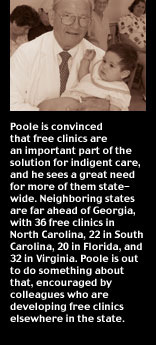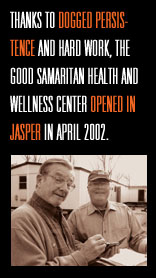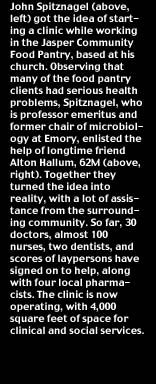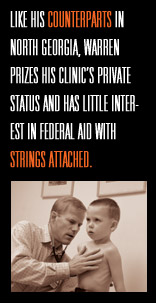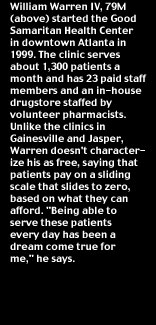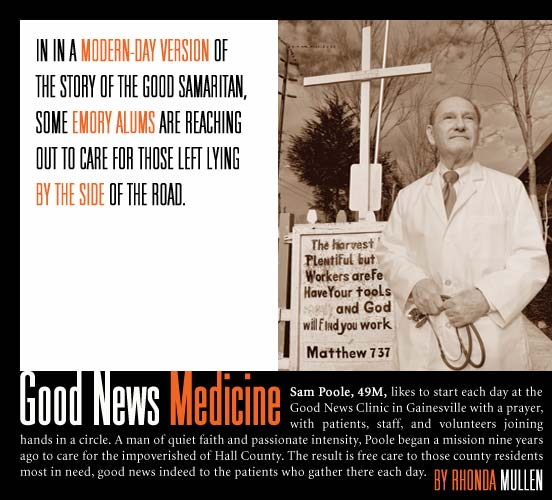
The way we learned medicine at Grady was that you help the indigent,”
says Poole, who says he finds helping those in need therapeutic for his
own health. “I’ve had two failed back operations, but when I’m
seeing these patients, it completely takes my mind off my back.”
Poole gives
credit for starting the Good News project to Susie Harris, his neighbor
and former nursing director at the Northeast Georgia Medical Center, where
he was director of cardiology until he retired. Harris and Poole go back
35 years. “The nurses at the hospital used to be a little afraid
of him,” Harris confides. “He’s a tough doctor, and he
always demanded their best. But he’s also a good doctor and a good
man.”
That mixture
made Poole just the person to lead a new medical mission in Gainesville.
In 1993, he and Harris first saw patients in cramped quarters at the Good
News Mission, treating patients in two small rooms meant to be closets.
By the end of 1994, the group had seen close to 4,000 patients, and they
went looking for better space.
In the search,
Poole discovered that the clinic would qualify for $600,000 in federal
aid, but he decided not to take it. “The money had not only strings
but also ropes and chains attached to it,” he says. “They wanted
us to move to a better part of town and see a better clientele, and they
wouldn’t let us start our day in the clinic with a prayer or devotional.”
Instead,
Poole found private support to renovate a glass works storage facility
next door to the mission. (Donor Ann Warren Thomas provided the “seed
money,” he says.)
Against an
industrial backdrop of aged warehouses, barbed wire fences, and a red-
and white-checked water tower, the Good News Clinic opened its doors in
1995. Here patients have access to free medical services, including primary
and specialist care. Ed Burnette, a 1961 graduate of Emory’s dental
school, directs the clinic’s dental arm, the Green Warren Dental
Clinic, named for Ann Thomas’s father.
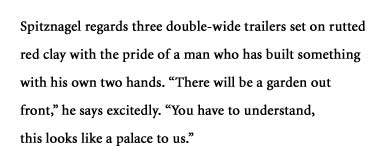
Some 100
volunteers, 44 dentists, and 30 physicians (including 12 Emory alumni)
keep the clinic running each weekday and three nights a month. “Plus,
there are 50 doctors in town who will provide free consults,” says
Poole. The clinic has only four salaried employees—two nurses, a
dental assistant, and a full-time interpreter. In 2001, the clinic treated
about 10,000 people. (BACK
TO TOP)
About 65%
of these patients are Hispanic workers and their families—some 40%
employed in the Hall County poultry industry. In treating this group,
Poole finds the biggest challenge is changing lifestyle to control high
blood pressure, diabetes, and obesity.
One of his
more dramatic cases involved a middle-aged Hispanic man who was losing
strength in his legs and his hands. When the patient visited the Good
News Clinic, he was already too weak to continue working at the poultry
plant. Poole examined him and determined that he was headed toward paraplegia
if something wasn’t done soon. Poole recruited a neurosurgeon to
operate free of charge on two cervical disks pressing against the man’s
spinal column. Today, the man walks normally and is back at work.
The local
hospital even waived the charges for its services and, in fact, regularly
donates lab and radiology work to the clinic. This is in part because
of Poole’s advocacy and in part because it is good business. “In
this instance, the hospital had to eat a little bill,” Poole says,
“but in the end, the clinic saves them money. We keep people who
can’t pay out of the hospital. We can offer good care for folks inexpensively
because we are high touch and low tech. We see our patients often and
can take our time with them, and they don’t need so many fancy tests.
A long-term relationship with a doctor is a luxury most of these people
have never had.”
In addition
to free care, the clinic provides free medicine, most from doctors’
office samples. That practice has been complicated by recently tightened
FDA regulations. In fact, the clinic may soon join other free clinics
around the nation in fighting those regulations in court. “The FDA
doesn’t want us to give free medicine because it fears physicians
could make a mistake,” Poole says. “But free medicine is the
base of our care. If a person doesn’t have a cent to his name, he
can’t pay for medicine.”
Poole’s
efforts have received recognition and gratitude in Gainesville, where
the Rotary Club named him Man of the Year in 2001. He is uncomfortable
in the spotlight, however, and would rather deflect attention toward his
cause. He is convinced that free clinics are an important part of the
solution for indigent care, and he sees a great need for more of them
statewide. Neighboring states are far ahead of Georgia, with 36 free clinics
in North Carolina, 22 in South Carolina, 20 in Florida, and 32 in Virginia.
Poole is out to do something about that, encouraged by colleagues who
have developed free clinics elsewhere in the state. (BACK
TO TOP)
The word
has spread
Every Friday, volunteers at the Jasper Community Food Pantry package groceries
for more than 125 needy families in Pickens County. The pantry is based
at the Episcopal Church of the Holy Family, where John Spitznagel, professor
emeritus and former chair of microbiology at Emory School of Medicine,
is a member.
Many of the
clients of the food pantry have serious health problems, and their situation
got Spitznagel and others to thinking. “We heard one sad story after
another—single mothers trying to work and pay their bills, elderly
people choosing between buying food or medicine,” he says.
To learn
more about the extent of the need, he surveyed Jasper businesses and two
local hospital emergency rooms and consulted food pantry and census data.
He found that 14% of Pickens County residents live below the poverty level
and that half of all those eligible for Georgia’s Peachcare program
for children can’t afford the monthly co-pay.
Inspired
by Poole (with whom he served on the house staff at St. Louis’s Barnes
Hospital in the early 1950s), Spitznagel and his old friend Alton Hallum
Jr., 62M, decided to start a free clinic of their own. Thanks to dogged
persistence and hard work, the Good Samaritan Health and Wellness Center
opened in Jasper this spring.
They’ve
had a lot of help. A volunteer grant writer raised money for equipment.
The Pickens County Commission donated land behind the county health department.
The commission and the mayor of Jasper donated a trailer, and the clinic
raised funds to buy two more. Volunteers renovated the space, which provides
4,000 square feet for clinical and social services.
To date,
30 physicians, almost 100 nurses, two dentists, and scores of laypeople
have signed on to help. Four local pharmacists have agreed to help provide
medicine, and the group has forged a working relationship with a local
hospital.
Spitznagel
is heartened at how the community has pulled together to care for the
indigent. Like Poole, he and Hallum believe that grassroot efforts can
succeed where federal programs have fallen short.
“Early
in my practice, there was no Medicare or Medicaid,” says Hallum.
“We told the affluent: ‘We need to charge you more to cover
the costs for those who can’t pay.’ Now, the standards for Medicaid
are tougher, and some 45 million people fall through the cracks.
“There
has to be a system like this to take care of people who can’t pay.
Our effort is run largely by retirees who want to give back. If everybody
pitches in, we can fill in the gaps, and we can do it better and more
efficiently than the government.” (BACK
TO TOP)
Those
with ears, let them hear
In 1995,
William Warren IV, 79M, traded in a successful pediatrics practice in
the Atlanta suburbs to establish his own medical practice for the working
poor and homeless in a no-man’s land downtown. “This was a way
to flesh out my Christianity,” says Warren, the great-great-grandson
of Coca-Cola founder Asa Candler. “The more I thought and prayed
about it, I found my calling was to the inner city.”
For three
years, Warren volunteered at several free clinics around Atlanta, working
at Techwood Baptist Center, the Mercy Mobile unit at Central Health in
Grant Park, and even venturing as far north as Gainesville once a week
to work alongside Sam Poole.
These were
training grounds for Warren, and by 1998, he had learned some important
lessons about what worked and what didn’t. For starters, he discovered
he needed his own place. His practice in the Baptist Center was limited
by space, and the health center there competed with other needs the church
was trying to meet. “You can’t do job training, provide clothing
and food, and dispense health care, all these little bits of things, all
at the same time. You end up doing none of them particularly well,”
says Warren.
Raising more
than $2 million, including money of his own, Warren renovated an old warehouse
to house his new clinic. The Good Samaritan Health Center sits north of
Centennial Olympic Park. Each weekday from 8:30 to 5, two doctors, two
nurse practitioners, two dentists, a counselor, support staff, and volunteers
serve patients in need. The working poor make up 65% of the practice,
and 10% of its patients qualify for Medicaid, which the clinic accepts.

Like his
counterparts in north Georgia, Warren prizes his clinic’s private
status and has little interest in federal aid with strings attached. (“This
is a Christian mission,” he says. “If I want to hang the Ten
Commandments on the wall, I can.”) Unlike the clinics in Gainesville
and Jasper, however, Warren doesn’t characterize his as free. ”We
have a different philosophy—that our patients want to pay what they
can afford and that they should. We have a sliding scale. But people who
can’t pay don’t.” Warren’s clinic is also the largest
of the three clinics, with 23 paid staff members. (BACK
TO TOP)
The patients
who come to the Good Samaritan—some 1,300 a month—hear about
the center by word of mouth and referrals from shelters and charitable
organizations. “Their medical and dental needs are the same as yours
or mine,” Warren says, “but their social needs are gargantuan.
They have so much life complication and baggage. They live from crisis
to crisis. If they’re hungry, they take care of that that day. If
they have an earache, they will take care of that. If they have high blood
pressure, well, that can wait.”
Warren recently
saw a 13-year-old diabetic who had gone without insulin for two weeks.
It took him two phone calls to reach her previous doctor to discuss her
medications, more time to check the clinic’s pharmaceutical stock,
and still more time to enroll the patient in a government assistance program
for diabetics.
Providing
medicine is essential to the practice, and an in-house drugstore, staffed
by volunteer pharmacists, dispenses drug samples. The clinic enrolls some
patients in programs offered by pharmaceutical companies for the poor.
If Medicaid, the samples, and the drug programs cannot meet a patient’s
needs, the clinic issues a medication voucher paid out of its operating
budget, about $1.1 million per year.
Despite the
many challenges inherent in operating such a clinic, Billy Warren, like
the other good news doctors, finds immense joy in this work. “It’s
true,” he says, “that ‘without a vision, the people perish.’
For me, being able to serve these patients every day, this is a dream
come true.”
Physicians
who would like to volunteer their time and service can call the following:
Good News
Clinic in Gainesville: 770-503-1369
Good Samaritan in Jasper: 706-579-1226
Good Samaritan in Atlanta: 404-523-6571, ext. 226
Rhonda Mullen is an Atlanta freelance writer.
Copyright © Emory
University, 2004. All Rights Reserved
